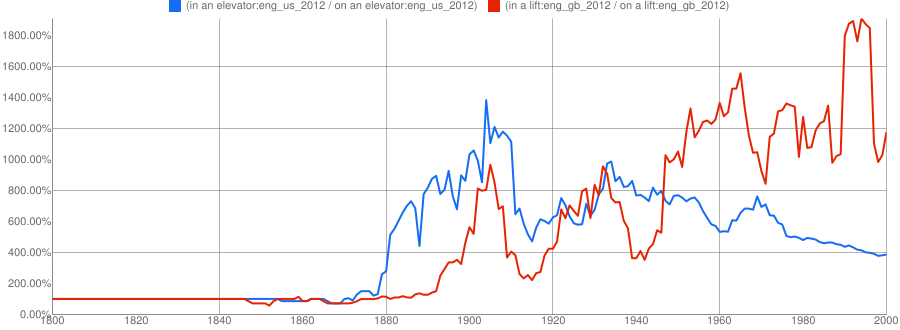Qualitatively, 'in' usually is used for the metaphor of being within a surrounding structure, like a room or enclosure.
And 'on' is usually used for the metaphor of taking the conveyance (or more literally being on the top of a surface).
For example, being 'in a train' implies being inside a train car, being 'on a train' implies traveling using a train (or could mean you're traveling literally on the mostly flat roof of the train).
An elevator shares this ambiguity. 'In an elevator' is inside the box-like enclosure of the conveyance. 'On an elevator' is using the conveyence, like 'on a train, boat, plane'.
Also, note that 'lift' is a synonym for 'elevator' in the UK, where it is not at all in the US.
So as to frequency, a good quantitative, data driven comparison can be done using Google nGrams.
First let's look at the 8 possibilities of 'in' vs 'on', 'elevator' vs 'lift', US vs UK
Frequency of 'in' and 'on' an 'elevator' and 'lift' in US and UK

First this confirms that 'lift' is rare in the US (the context for 'in a lift' seems likely to mean only as a synonym for elevator). Also, it is interesting to note that 'lift' and 'elevator' in the UK are mostly the same.
I interpret the graph to simply mean that, whether in or on an elevator, such statements are much more common in the US than in the UK. But eyeballing the relative frequencies, it looks roughly the same, that 'in' is used a lot more than 'on', whether restricted to the US or to the UK.
Fortunately, NGrams has some syntax to take ratios of two frequencies. This allows us to compare the ratio of 'in' to 'on' for elevators. Maybe Americans use 'on' much more frequently than 'in'. Also, to simplify, let's stick to elevator for the US ('lift' is so rare) and 'lift' for the UK (since it is roughly the same as 'elevator'):
Ratio of 'in' to 'on' a lift in UK vs an elevator in US

The ratios change over time, and between the US and UK, they cross a few times.
Considering after 1960, when they don't cross over so much, the UK favors 'in' to 'on' much more than the US does. So it is not surprising that when a BrE speaker visits the US, the few times more that people say 'on' in AmE might stand out
So, nowadays, to corroborate your feeling, the US is actually using 'on' more with respect to 'in' than in the UK. But in both places 'in' is still used more than 'on'. just not as much in the US.
Note: corpus searches like these have all sorts of caveats: mis-labelings of sources to UK or US, dates, but mostly fears of catching text with those searches that are not what you expected. I think that the complete prepositional phrase is long enough and not needing any context, to avoid most problems. If there are conflicting contexts or alternate terms that you can think of, they are welcome.


